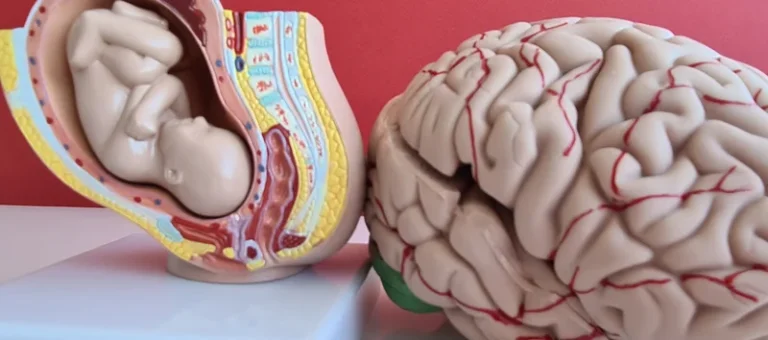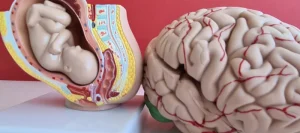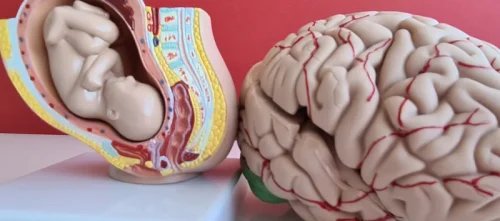Fetal Alcohol Syndrome and Fetal Alcohol Spectrum Disorders

Alcohol exposure damages neural progenitor cells, limiting their survival and impeding their differentiation into astrocytes (Taléns-Visconti et al., 2011; Nash et al., 2012). Culture models using neurospheres also demonstrate that selective exposure of neural precursor cells to alcohol impairs cell division and astrocyte formation (Vemuri and Chetty, 2005). Thus, alcohol exposure disrupts the development and maturation of radial glia cells that act both as precursor cells for neurons, astrocytes and oligodendrocytes, as well as aid in the migration of other progenitor cells throughout the developing CNS (Table 2). Fetal alcohol syndrome (FAS) is a condition that develops in a fetus (developing baby) when a pregnant person drinks alcohol during pregnancy. A syndrome is a group of symptoms that happen together as the result of a particular disease or abnormal condition. When someone has fetal alcohol syndrome, they’re at the most severe end of what are known as fetal alcohol spectrum disorders (FASDs).

Mental Health 101
Most often, FAS is diagnosed based on the mother’s history and the appearance of your baby, based on a physician examination by a physician. Substance misuse counseling and treatment programs can help with overcoming alcohol or recreational drug use. Joining a support group or 12-step program such as Alcoholics Anonymous also may help. Using the information that is available, the Centers for Disease Control (CDC) and other scientists estimate less than 2 cases of FASD in every 1,000 live births in the United States.
Behavioral Symptoms
In these, the most severe cases of FASD, damage is ubiquitous throughout the brain (Riley and McGee, 2005). A general CNS disorganization is observed, with errors in neuronal migration, neuroglial heterotopias, microcephaly, and abnormalities of the brainstem, cerebellum, basal ganglia, hippocampus and corpus callosum, pituitary gland and optic nerve (Jones et al., 1973). The degree to which these characteristics are present in individuals that do not die during development or early childhood is unclear, but these findings are reflective of the widespread disruption of normal brain development that results from alcohol exposure. Alcohol can cause problems for the baby throughout pregnancy, including before a person knows they are pregnant. Alcohol use in the first 3 months of pregnancy can cause the baby to have abnormal facial features. Growth and central nervous system problems (for example, low birthweight, behavioral problems) can occur from alcohol use anytime during pregnancy.
- When astrocyte cultures are exposed to alcohol, GFAP levels increase initially after which GFAP expression decreases after 21 days in culture (Saez et al., 1991).
- Radial glia exhibit processes that “radiate” in a directed, polarized fashion, thereby giving the cells their name.
- The CDC explains that there’s no safe time to consume alcohol during pregnancy.
- The Centers for Disease Control and Prevention (CDC) explain that roughly half of all pregnancies in the United States are unplanned.
- If you adopted a child or are providing foster care, you may not know if the biological mother drank alcohol while pregnant.
What Are Fetal Alcohol Spectrum Disorders?
Fetal alcohol syndrome happens when a person drinks any alcohol during pregnancy, including wine, beer, hard ciders and “hard liquor”. One reason alcohol is dangerous during pregnancy is that it’s passed through your bloodstream to the fetus through the umbilical cord. The baby doesn’t metabolize (break down) alcohol in the same way an adult does – it stays in the body for a longer period of time.
Fetal alcohol spectrum disorders describes the range of conditions in children caused when the mothers drank alcohol during pregnancy. Symptoms drunken baby syndrome vary greatly among children and can include all or a mix of physical, behavioral, and learning and thinking problems. Alcohol use during pregnancy causes life-long issues that can be very serious. If you’ve consumed alcohol during pregnancy, talk to your healthcare provider. It’s important to make an early diagnosis of fetal alcohol syndrome.
I have a busy office. How can fit in screening and intervention for at risk alcohol use?
Fetal alcohol syndrome (FAS) is a group of abnormalities that occur in babies born to mothers who consume alcohol during pregnancy. It is the most common known non-genetic (in other words, non-inherited) cause of mental retardation in the United States. It is estimated that as many as three babies in 1,000 will have FAS. However, the rate may be three times higher in some groups of people. To diagnose fetal alcohol syndrome, doctors look for unusual facial features, lower-than-average height and weight, small head size, problems with attention and hyperactivity, and poor coordination. They also try to find out whether the mother drank while they were pregnant and if so, how much.

Charitable Care & Financial Assistance
- Early diagnosis and services can help improve your child’s ability to function.
- There are a variety of treatments available for pregnant women, including behavioral treatment and mutual-support groups.
- Research shows that alcohol exposure at specific times during pregnancy can affect the brain in various ways, resulting in a spectrum of brain disorders.
The resulting conditions may cause physical, developmental, or a mix of both physical and developmental disabilities ranging in severity from mild to severe. Fetal Alcohol Spectrum Disorder is an umbrella term describing a broad range of adverse developmental effects that can occur in an individual with prenatal exposure to alcohol. A child or adolescent with an FASD may have a combination of physical, neurodevelopmental, neurocognitive, and behavioral problems with each manifesting a range of severity. It is not known how many people in the United States have an FASD. Several initial studies, using active case findings of school-aged children, indicate that 1% to 5% of children in the United States may have an FASD. Centers for Disease Control and Prevention data indicate that approximately 12% of pregnancies may have alcohol exposure, which can lead to FASD birth defects.


Clinical trials demonstrate that brief interventions can promote significant, lasting reductions in drinking levels in at-risk drinkers who are not alcohol dependent. Studies have shown that once advised by their physician, brief intervention and education for at-risk alcohol use is equally effective when delivered by a nurse or other mid-level professional specialist. In a report outlining patient intervention for alcohol use within five managed care organizations, 60% of those patients receiving the intervention reduced their alcohol consumption by one or more drinks per week.

How is fetal alcohol syndrome diagnosed?
Some of the most severe problems happen when a pregnant person drinks in the first trimester, when the baby’s brain starts to develop. The brain is still developing then, and even moderate amounts of alcohol can disturb this process. Early intervention and a stable, nurturing home are important to protect children with fetal alcohol syndrome from some of the other issues they’re at risk of later in life. The symptoms of this condition will be with the person throughout their entire life.
